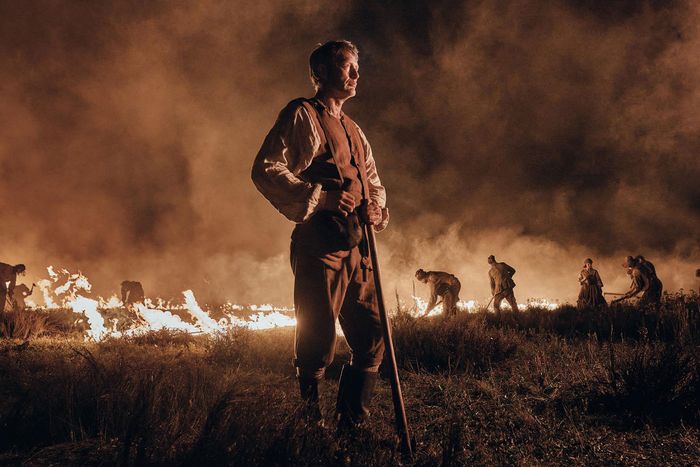
Lev Kuleshov would have wet his pants at the sight of Mads Mikkelsen. The Soviet filmmaker and theorist, best known now for stating that the exact same inexpressive shot of an actor could convey any number of feelings depending on what image you cut it with — a phenomenon now known as the “Kuleshov effect” — believed that montage was at the heart of filmmaking. Actors were models, there for the quality of their faces and the physicality of their bodies, and not so much for their actual acting abilities. They were meant to be molded and bent and reshaped by their directors.
Mads Mikkelsen is a phenomenally skilled actor, but he’s also clearly the kind of performer who understands the value of a good, cold, hard stare. Partly this is because of the marvelous quality of his face, one of the greatest in all of cinema. Those deep eyes and those perpetually jutting lips seem like they can evoke rage, pity, bemusement, or desire with almost no effort. It’s one of the reasons why so many Mikkelsen roles seem like they were designed in a lab specifically for him. Beyond his actual talents, we can read what we want in the man.
Even with all that, Mikkelsen is uniquely well-suited for the role of Captain Ludvig Kahlen, an impoverished Danish war veteran who sets out in the mid-18th century to try and tame the Jutland Heath, a huge and forbidding area where no crop can grow and where lawlessness reigns. Kahlen was a historical figure, but not much is known about him. (The film is based on the novel The Captain and Ann Barbara by the Danish author Ida Jessen.) We first see him sitting by a fire, polishing his medals. He has nothing else in this world — not even, apparently, a house — but he aspires to nobility and status. He wants to establish a settlement on the heath in the name of the king. The royal advisers, assuming he’ll fail like everyone else who’s tried to do it, give Kahlen the permission to do so, because the King himself has a dream of settling the area and they can pretend to be pursuing this quixotic goal.
The Danish title of the film, Bastarden, translates as “the bastard,” and could be both a literal and spiritual description of Kahlen. He was born to an unwed servant (most likely the result of her master taking advantage), and he is, at least at first, a tough, at times heartless taskmaster. He’s a stickler for propriety and order, obsessed with his mission and his quest for a title. But he also learns that in order to survive on the heath, he has to learn to rely on others. A fugitive couple, Johannes and Ann-Barbara (Morten Hee Andersen and Amanda Collin), soon join his meager settlement. Despite the grubbiness of his surroundings, Kahlen insists that Ann Barbara serve him his gruel in neat, centered bowls. In his mind, he’s already the proper aristocrat he hopes to be. (Again, I cannot adequately express to you how perfect Mikkelsen is in this role; that sensuous frown of his has infinite layers.)
Johannes and Ann Barbara have fled the clutches of a local landowner, a preening and sadistic aristocrat named Frederik de Schinkel (another historical figure, played with flamboyant insolence by Simon Bennebjerg). De Schinkel wants his servants back, and he’s also irked at the thought of Kahlen establishing a settlement in the name of the king, which would dilute the nobleman’s power. Plus, de Schinkel is, to put it mildly, something of a psychopath. This is where The Promised Land transforms from a stately and lyrical tale of rural survival to something more primal and intense; think Terrence Malick’s Days of Heaven crossed with Michael Caton-Jones’s Rob Roy, only with more scenes of people being boiled alive. De Schinkel’s cruelty and violence force Kahlen into changing his own ways, because here is a confrontation with a repulsive, real-life version of the privilege he seeks for himself. Now, Mikkelsen’s face takes on the quality of disgust, and of slow-burning vengefulness.
Nikolaj Arcel was one of Denmark’s most acclaimed directors (having made the political thriller King’s Game and the doomed historical romance A Royal Affair, which was nominated for an Oscar) when he came to the U.S. and made the much-reviled (and much tampered-with) Stephen King adaptation The Dark Tower in 2017. Some directors, when faced with such disappointment, stick around and continue to try and prove themselves in the Hollywood blockbuster game. Others go back to basics. Arcel seems to have picked up where he left off in Denmark, telling stories of individuals who have bought into the rules of the established order, only to find their devotion, and sometimes their very selves, snuffed out by the ruthlessness of power. But he’s also kept a foot in genre, in the visceral storytelling that American movies have traditionally done so well. The result is the kind of ravishing, rousing epic we don’t really get much of anymore.
More Movie Reviews
- The Accountant 2 Can Not Be Taken Seriously
- Another Simple Favor Is So Fun, Until It Gets So Dumb
- Errol Morris Has Been Sucked Into the Gaping Maw of True Crime


